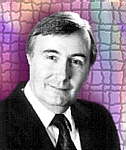 From the Desk of Howard Lincoln
From the Desk of Howard Lincoln From the Desk of Howard Lincoln
From the Desk of Howard LincolnI would like to open this article by expressing my appreciation to all of Nintendo's staff who helped to make this interview possible--and a special thanks to Steve Henkel of Seattle who was instrumental in starting talks with Howard Lincoln himself. Thanks guys!
Ferrari Man: There have been rumors of a SNES adapter to play NES games--similar to the Genesis Master System Adapter. Do you plan on marketing such a device?
Nintendo: No. Nintendo's hold on the 8-bit market is strong. The only purpose for such an adapter would be for people who owned neither machine and were going to buy only one. First, this market is small. Second, both SNES and NES units can be hooked in series [hooked up to your television at the same time], and third, the unit would be nearly as expensive as the NES unit itself.
FM: With the new "WorkBoy" hardware, where do you see the Game Boy market heading?
N: We aren't trying to lead it anywhere. We hope to keep the Game Boy the leader in the portable market by keeping a wide ranged buyers market.
FM: What are your plans for the color Game Boy?
N: Hmm... seems the media often knows more than we do about our products. No comment. However, we are not planning on abandoning the Game Boy.
FM: With CD technology ever expanding, and Phillips seemingly the leader, how much technology from their CD-I will you use?
N: Lots. Our CD-XA system is well beyond the competitions. XA stands for "Extended Architecture" which allows us 16 times more memory than standard CDs. Imagine a music CD with 16 hours of music.
FM: Will the CD-XA be able to produce full screen, full motion video?
N: Yes, like you've never seen before. The XA technology also allows for interleaving.
FM: What is "interleaving"?
N: Interleaving is a relatively new technology even with PC based units that allows access to two tracks of information simultaneously, so that both video and audio are loaded together.
FM: What does that do for the gamer?
N: It keeps access time to a minimal and allows for special functions.
FM: Are there any other CD facts that are new?
N: Yes. We are actually developing two separate CD units. Our second unit is planned for multi-media use. It is not a game. It will utilize Nintendo characters [Mario, Link, etc.] in its environment. Comic books and other things should be expected.
FM: With co-development, when do you plan to release the CD unit [for gaming]?
N: 1st Quarter of 1993--most likely, January. We will begin with a production run of 300,000 units a month, and we will market it at less than $200.
FM: What game titles will be released with the unit?
N: We began development in January of '92 on games for the system, and we plan on Falcon 3.0 and 7th Guest to debut with the system. We are trying to push CD to its limit. Unlike the competitions new unit [Sega] the games on our CD will be well beyond the limits of EPROM [cartridge] based games.
FM: Other than the XA technology, what puts your CD unit on top by a hardware standpoint?
N: Several things... Our CD contains a real time graphics co-processor, 8M RAM (main), 1M RAM (secondary), 150Kb per second data transfer, and a .75 second average access time.
FM: Explain how this improves games.
N: With increased RAM, we can manipulate more backgrounds and characters. With fast processors, slowdown will be unheard of, and low access time means no ‘pauses' between levels like our competitors. And, with 540MB, memory will not likely be a problem.
FM: Will the CD contain a speed-up card for cartridge based games?
N: At this time, I'd lean toward no because of the cost--we want this under $200. You haven't noticed any slowdown in the new games, have you?
FM: No.
N: It was just a case or learning to use the machine. The SNES processor numbers are actually quite deceiving. Yes, CPU speed is slow--but, essentially the SNES has several separate processors. Sound is not run through the CPU. Neither are special Mode 7 effects. So, actually, all the processor needs to control is sprite placement. Initially, we were trying to use it for everything. This slowed it down. Now that we've learned more, we should not have any problems.Even with games as complex as Street Fighter II, we can avoid slowdown by properly channeling our commands.
FM: What are your projections for the future of Nintendo and the video game industry as a whole?
N: Are you referring to Nintendo vs. Sega?
FM: That also, yes.
N: Is there a question? Nintendo has surpassed Sega in unit sales already. 3rd party licensees are flocking to us. Sega isn't a question.
FM: How about video games in general?
N: I see us moving out of the arcades and into homes. Nintendo started in arcades, and now they're our smallest section. Multi-media seems to be the trend--that and converting last generation PC games to current generation cartridge based home games.
FM: Any last notes?
N: Video games are here to stay.
Originally appeared Vol 1, Iss 3 (08-09/92)